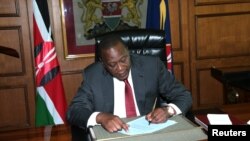Kenyan President Uhuru Kenyatta made history last week as the first sitting head of state to appear before the International Criminal Court at The Hague. Despite this, the prosecution says its case against him, for allegedly orchestrating deadly election-related violence in Kenya, is falling apart. There are unique challenges of trying a world leader who still wields influence.
Uhuru Kenyatta is not the first powerful man to be indicted by the ICC. But Kenyatta is currently leading a country and that brings with it a different set of issues not just those of sorting out legal precedents but dealing with the power and influence his position brings.
Fergal Gaynor, a lawyer for some of the Kenyan victims of violence, said Kenyatta’s trial has been very different.
“This is a case involving an extensive set of steps taken by the Kenyan state, headed by the accused, to obstruct the emergence of truth and the course of justice,” said Gaynor.
The prosecution has admitted at the October 8 hearing that it has scant evidence against Kenyatta but said that was because the government was obstructing the investigation.
Prosecution attorney Benjamin Gumpert told the court the evidence did exist but said prosecutors needed access to financial and phone records.
“We know that there are 33 months’ worth of bank statements which have not been provided, under compulsion or otherwise. We know that material is available. But we can’t consider it. Why? Because we are being obstructed from doing so,” he said.
Kenya’s attorney-general insisted the government has been doing everything possible to cooperate with the ICC.
But accusations of obstruction have dogged the case from the start. The prosecution also said key witnesses in Kenya were being intimidated and several have already withdrawn their testimony.
Eric Mutua, chairman of the Law Society of Kenya, said that with someone so powerful in the dock, such problems were bound to arise.
“You’re trying someone who is influential in terms of politics. You’re trying someone who has money. You’re trying someone who has the police machinery at his disposal. And he can use a lot of influence, he can use a lot of force, intimidation, very many avenues to silence either witnesses, to silence any other persons who are pursuing the case on the side of the prosecution,” he said.
Kenya’s witness protection program was run by the government, said Mutua, and could easily have been compromised in this case. Other key institutions reported directly to the president as well, he added, including the attorney-general and the police force.
That is where the ICC is supposed to come in -- to be able to facilitate justice when an impartial trial may not be possible in the country where the crimes took place.
Kenya is a signatory to the Rome Statutes that created the court, and as such is legally obligated to cooperate with the ICC.
But asking the Kenyan government to help convict its own leader could be expecting too much, said Mutua. As long as Kenyatta remains president, he adds, it may be impossible to build a case against him.
“For there to be effective prosecution, in my view, there must be a regime change, where we have a sitting head of state who is not being tried and is fully cooperating with the ICC. Naturally, the other institutions will want to cooperate if the president is not obstructing, if the president is not directing otherwise,” Mutua said.
The Kenyatta case is seen as a major test for the ICC, which has secured only two convictions since it began operating in 2002.
Kenyatta - who maintains his innocence - faces five counts of crimes against humanity for his alleged role in overseeing post-election violence in Kenya during late 2007 and early 2008. The unrest killed about 1,100 people and displaced more than 500,000 others.
While the prosecution has asked for an indefinite adjournment, Kenyatta’s defense team is pushing for the case to be dropped completely. The judge has yet to decide which it will be.




